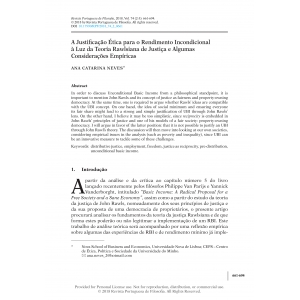Acemoglu, Daron. NBER Working Papers. 2016. http://www.nber.org/papers/w22252.pdf.
Atkinson, Anthony B. Desigualdade – o que fazer? . Bertrand Editora, 2016.
Baptista, Rodrigo. “Observador.” Observador. 2017. http://observador.pt/2017/05/03/banco-de-portugal-fraca-produtividade-do-trabalho-e-fator-de-preocupacao-e-exige-mais-investimento/.
Bregman, Rutger. Utopia for Realists: The case for a universal basic income, open borders and a 15-hour workweek. The Correspondent, 2016.
Bunker, Nick. “World Economic Forum.” World Economic Forum. Maio de 2017. https://www.weforum.org/agenda/2015/05/what-drives-productivity-growth/.
Donselaar, Gijs van. The right to exploit: Parasitism, Scarcity, Basic Income . New York: Oxford University Press, 2008.
Economist, The. Labour pains. 2013. https://www.economist.com/news/finance-and-economics/21588900-all-around-world-labour-losing-out-capital-labour-pains; .
Freeman, Samuel. “Property-Owning Democracy and the Difference Principle.” Analyse & Kritik, 2013: 9-36.
Guardian, The. Automation will affect one in five jobs across the UK, study says. 2017. https://www.theguardian.com/business/2017/oct/16/automation-jobs-uk-robots.
“Expresso.” Expresso. 2017. http://expresso.sapo.pt/revista-de-imprensa/2017-05-22-Portugal-e-o-terceiro-pais-da-UE-com-maior-precariedade-laboral-entre-os-jovens.
“Jornal Económico.” Jornal Económico. 2017. http://www.jornaleconomico.sapo.pt/noticias/fuga-de-cerebros-representa-40-da-emigracao-portuguesa-anual-estima-academico-241811.
Jackson, Tim. Prosperity without Growth – Economics for a finite planet . Routledge, 2009.
Knight, Carl. “Luck Egalitarianism.” Philosophy Compass (Wiley-Blackwell Publishing, Inc.) 8 (10) (2013): 924-934.
Meade, J. E. Liberty, Equality and Efficiency. Apologia pro Agathotopia Mea. New York: Palgrave Macmillan, 1993.
OECD. OECD Employment Outlook 2012. Institucional, OECD, 2012.
O’Neil, Martin, e Thad Williamson. Property-Owning Democracy: Rawls and Beyond. Richmond, Virgina: Wiley-Blackwell , 2012.
Peralta, Susana. “Público.” Público. 2017. https://www.publico.pt/2018/02/19/economia/opiniao/sera-que-os-portugueses-nao-querem-trabalhar-1803545.
Pereirinha, José. “Rendimento Adequado em Portugal.” 2017.
Rawls, John. Justiça como equidade – uma reformulação. London, England: Livraria Martins Fontes Editora Lda. , 2003.
Rawls, John. “Justice as Fairness: Political not Metaphysical.” Philosophy and Public Affairs 14 (1985): 223-251.
Rawls, John. Liberalismo Político. Editorial Presença, 1997.
Rawls, John. Uma Teoria da Justiça. Lisboa: Presença, 1993.
Standing, Guy. Basic Income: and how we can make it happen . UK: Pelican Books, 2017.
Standing, Guy. “The Precariat and Class Struggle.” Revista Crítica de Ciências Sociais 103 (2014): 9-24.
Thomas, Alan. Republic of Equals: Predestribution and property-owning democracy. New York: Oxford University Press, 2017.
Vanderborght, Van Parjis e Yannick. Basic Income A Radical proposal for a Free Society and a Sane Economy. London, England: Harvard University Press, 2017.
Viana, Clara. “Público.” Público. 2016. Em https://www.publico.pt/2016/11/07/sociedade/noticia/portugal-foi-dos-paises-com-maior-fuga-de-cerebros-1750246.
White, Stuart. The Civic Minmum . New York: Oxford University Press , 2003.
Widerquist, Karl, José A. Noguera, Yannick Vanderborght, e Jurgen De Wispelaere. Basic Income: An Anthology of Contemporary Research. Wiley-Blackwell, 2013.









